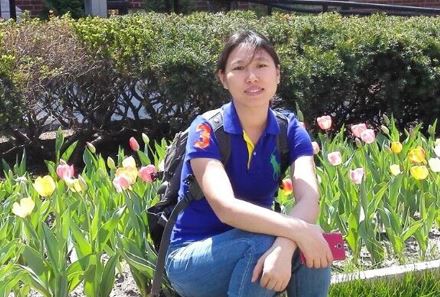Recognizing The Plant Cell author Fanli Meng

 Fanli Meng, first author of Genomic editing of intronic enhancers unveils their roles in regulation of tissue-specific gene expression in Arabidopsis thaliana
Fanli Meng, first author of Genomic editing of intronic enhancers unveils their roles in regulation of tissue-specific gene expression in Arabidopsis thaliana
Current Position: Professor, College of Agriculture, Northeast Agricultural University (NEAU), China
Education: Ph.D., Genetics at Shenyang Agriculture University, China; Master, Biochemistry and Molecular Biology at Northeast Agricultural University
Non-scientific Interests: Reading and Cooking.
Brief bio: In 2014, I joined in Dr. Jiming Jiang’s lab at the University of Wisconsin-Madison as a visiting scholar. Dr. Jiang and I discussed and initiated a project on prediction and validation of intronic enhancers in Arabidopsis thaliana since his lab just completed a similar project on “intergenic enhancers”. After returned to China in 2016, I continued to study the function of several targeted intronic enhancers. We decided to use CRISPR/Cas to develop deletion lines of the target enhancers although we wondered if deleting part of an intron would interfere gene splicing, which would prevent our goal to study the function of the enhancers. Luckily, all deletion lines show normal splicing! Amazingly, the deletion lines did not abolish gene expression but caused varying levels of transcriptional repression of their cognate genes. Most remarkably, the transcriptional repression of the deletion lines occurred at specific developmental stages and in specific tissue, which also resulted in distinct phenotypic effects on plant morphology and development. Thus, these intronic enhancers act as “fine-tuners” in regulation of cognate genes in a tissue- and development-specific manner.
姓名:孟凡立
现在职位:东北农业大学农学院教授
教育经历:沈阳农业大学博士;东北农业大学硕士
兴趣爱好:阅读和美食
个人简介:2014-2016年赴美国访学期间,加入威斯康星大学麦迪逊分校蒋继明教授实验室,利用拟南芥苗和花的DNA敏感位点(DNase I hypersensitive sites)数据在拟南芥全基因组范围内定位和鉴定内含子型增强子。2016年回国后,与蒋继明教授合作继续开展内含子型增强子调控基因表达的机理研究。利用CRISPR/Cas技术在拟南芥体内敲除内含子型增强子。内含子型增强子敲除后,同源基因的表达并没有完全消除且mRNA正常剪接,仅在拟南芥特异发育阶段或特异组织抑制同源基因表达,从而影响植株的形态和发育。利用酵母单杂交等蛋白-DNA互作技术进一步证实内含子型增强子通过结合不同转录因子来调控同源基因时空特异性表达。据此,我们认为,内含子型增强子精确调节其同源基因在不同发育阶段不同组织中的特异性表达。



